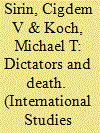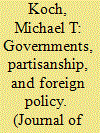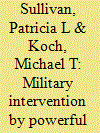|
|
|
Sort Order |
|
|
|
Items / Page
|
|
|
|
|
|
|
| Srl | Item |
| 1 |
ID:
146161


|
|
|
|
|
| Summary/Abstract |
Why are some authoritarian regimes so quick to surrender amid lower numbers of casualties while others prove willing to incur significant casualty counts to continue their war efforts? In this study, we explore the propensity of different authoritarian regime types to sustain casualties in interstate conflicts. We argue that authoritarian leaders with smaller winning coalitions find it easier to distribute the costs of militarized conflicts outside of those coalitions. This diminishes their sensitivity to casualties. Applying a theoretical model based on an inverse divide-the-dollar game (with respect to the distribution of public “bads”), we find that personalist regimes tend to sustain the highest number of casualties in militarized interstate disputes when compared to other autocracies. Our findings suggest that along with the audience cost abilities of an autocratic adversary, target states should also consider an autocratic regime's casualty sensitivity in deciding whether to reciprocate with military action.
|
|
|
|
|
|
|
|
|
|
|
|
|
|
|
|
| 2 |
ID:
093089


|
|
|
|
|
| Publication |
2009.
|
| Summary/Abstract |
Do variations in partisanship and political outcomes among democratic states affect the duration of militarized interstate disputes? To answer this question, the author develops a model of partisan competition derived from the government failure literature. The author argues factors associated with government failure determine the ability of governments to contend with the domestic political costs of militarized disputes, specifically the duration of those disputes. The author tests his expectations using hazard analysis on a dataset of 20 democratic governments and militarized disputes between 1945 and 1992. The results suggest the outcome of party competition in the form of a government's sensitivity to the potential political costs of conflict is an important part of the conflict process. The author concludes that differences in domestic political outcomes influence the duration of militarized interstate disputes. Governments that are politically more secure in their tenure engage in longer disputes. Alternatively, governments that are more vulnerable have significantly shorter disputes. In addition, because government partisanship contributes to vulnerability, it also affects dispute duration, with governments of the left engaging in shorter disputes, while governments of the right fight longer disputes.
|
|
|
|
|
|
|
|
|
|
|
|
|
|
|
|
| 3 |
ID:
090920


|
|
|
|
|
| Publication |
2009.
|
| Summary/Abstract |
The Military Intervention by Powerful States (MIPS) project develops a rigorous, generalizable measure of the effectiveness of military force as a policy instrument and applies the measure to code the outcomes of all military interventions conducted by five major powers since the termination of World War II. The MIPS dataset provides detailed data on US, British, Chinese, French, and Russian uses of military force against both state and non-state targets between 1946 and 2003. In particular, this project focuses on the political objectives strong states pursue through the use of force, the human and material cost of their military operations, and measures of intervention outcomes relative to the intervening states' objectives. The dataset also includes extensive data on factors commonly hypothesized to be associated with war outcomes, such as the nature of the target, the type of force used by the intervening state, and military aid and assistance provided to each side.
|
|
|
|
|
|
|
|
|
|
|
|
|
|
|
|
| 4 |
ID:
123142


|
|
|
|
|
| Publication |
2013.
|
| Summary/Abstract |
How does transnational terrorism affect the stability of parliamentary governments? Does terrorism cause some governments to fail prematurely and/or does it enhance the probability that some governments will stay in office longer than they otherwise would? Using a duration model on a sample of 18 advanced parliamentary democracies between the late-1960s and 2003, we find that terrorism exacerbates the likelihood of government failure for some governments but not others. Our principal finding is that right-oriented governments are able to keep their hold on power more than left-wing governments when confronted with transnational terrorism.
|
|
|
|
|
|
|
|
|
|
|
|
|
|
|
|
|
|
|
|
|